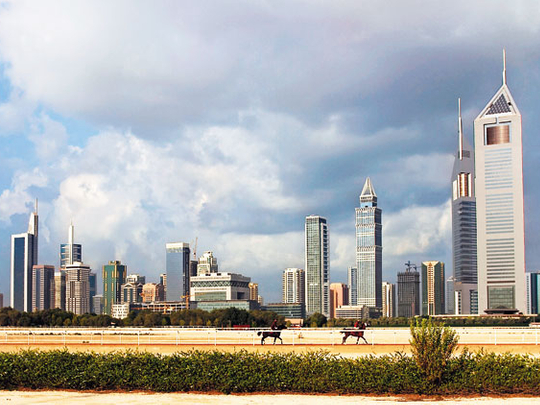
Dubai: Dubai's economic recovery could be quicker than anticipated, Stephen King chief economist at HSBC Holdings said in Dubai on Wednesday.
Speaking to reporters at the Capital Club, King said Dubai, currently going through a debt restructuring, will recover relatively quickly due to the rising oil prices and the good infrastructure it has built over the past few years.
Last week the Institute of International Finance (IIF) said in its regional outlook that Dubai's debt refinancing challenges are manageable and should be viewed in the context of the global financial crisis.
Dubai's gross domestic product (GDP) represents 33 per cent of the UAE's GDP and 55 per cent of the UAE's non-hydrocarbon GDP. The IIF estimates Dubai's debt at about $107 billion, equivalent to 136 per cent of its GDP while the UAE's a net foreign asset position is projected at $280 billion at end-2009, or about 130 per cent of GDP.
While the IIF has projected a 2 per cent GDP growth for the UAE in 2010 the International Monetary Fund expects it be 1.5 per cent.
"More clarity on Dubai's debt restructuring is going to have its upside on Dubai's growth prospects," said IMF Middle East and Central Asia Director Masoud Ahmad said earlier this week in Dubai.
Economists agree that despite the debt restructuring, Dubai's investments in infrastructure will help its quicker than expected recovery.
"The silver lining Dubai has is that it has built world-class infrastructure with its debts," said Khatija Haque, an economist with Shuaa Capital.
King said the infrastructure funded by the borrowing could help Dubai recover from recession. "The buildings aren't going to be knocked down afterwards, so the market adjusts," he said. "Maybe some people lose their money but after the adjustment phase comes through you sometimes find that the economy can right itself relatively quickly."
King sees a big role for economies such as the UAE, China, and Singapore in the post-crisis economic order. "The rise of state capitalism and vast sovereign wealth funds in Abu Dhabi, China, Singapore and Dubai will likely tip the terms of trade in favour of these newly powerful nations and city states," he said.
Africa deals
Speaking in Dubai about his new book Losing Control: The Emerging Threats to Western Prosperity, King pointed out that many Asian and Gulf states are already cutting exclusive deals with African countries to take over vast tracts of land for mining or growing crops to guarantee food security for their own populations.
"We're beginning to see the creation of a new, global Silk Road linking emerging nations in Asia, the Middle East, Eastern Europe, Africa and Latin America via land, sea and the electronic ether," he said.
— With inputs from Bloomberg












